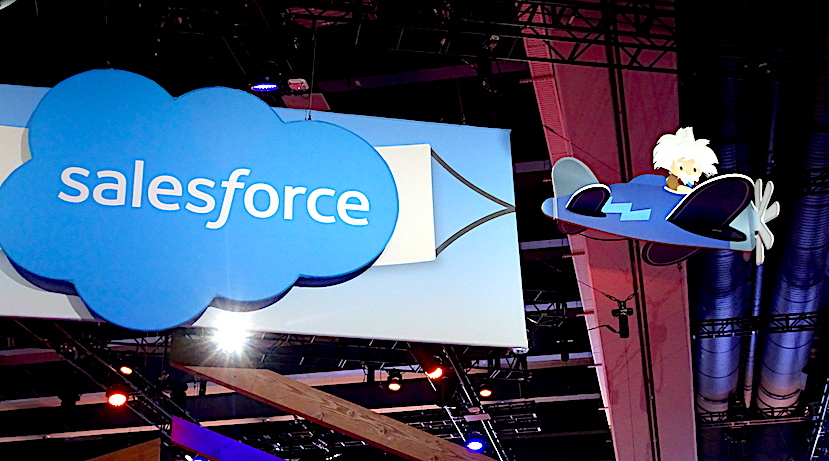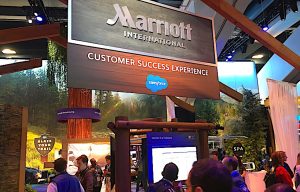 CLOUD
CLOUD
 CLOUD
CLOUD
 CLOUD
CLOUD
One company is the world’s largest hospitality conglomerate, opening a new hotel every 14 hours. The other enterprise is the fastest-growing of the largest U.S. software companies. Together, the two firms want to connect with customers in new ways using technology from a diverse ecosystem that includes Apple Inc. and Amazon.com Inc.
Marriott International Inc. and Salesforce Inc. shared the keynote stage at the latter’s Dreamforce conference in San Francisco on Tuesday, and comments from the leaders of both organizations highlighted how artificial intelligence and digital assistant technology are making their way into societal mainstream.
What’s powering Salesforce and major customers such as Marriott is connectivity, technology that is wrapping mobile usage with central enterprise platforms to deliver the richest possible customer experience.
“We are all deeply connected,” said Salesforce Chairman and co-Chief Executive Marc Benioff at his keynote address on Tuesday afternoon. “In the fourth industrial revolution, everything is connected and behind all of this is the customer.”
Marriott has big plans for using that connected technology to enhance the overall guest experience. The global hotel chain’s use of the Salesforce platform, combined with personal digital assistants from Apple and Amazon, can order a room service hamburger or set the in-room thermostat to a toasty 75 degrees just by issuing voice commands to devices soon to be located in Marriott hotel properties around the world.
With that smart, interactive technology comes greater knowledge, personal data gathered by the hotel to personalize the guest experience. “We want to use technology in a way that makes it simpler for you,” Arne Sorenson, president and CEO of Marriott, said during an appearance at a Dreamforce session on Tuesday morning. “If you’ve stayed with us before, we should know something about what you like.”
Knowing the full range of guest preferences takes data and the ability to interpret it. Salesforce embarked on its artificial intelligence journey in 2016 with the introduction of Einstein (mascot pictured) as its intelligence layer.
That was followed by the acquisition of MuleSoft Inc. for $6.5 billion earlier this year, which gave Salesforce the ability to share information across different systems, whether on-premises or in the cloud. Salesforce now had plenty of data and connectivity to go around.
 The remaining piece of the AI puzzle was the interface and Salesforce introduced Einstein Voice this month to give its platform smart conversational features. Einstein Voice essentially becomes the new middleware to link the voice systems in consumer homes — or hotel rooms — with one of the largest customer relationship management platforms in the world.
The remaining piece of the AI puzzle was the interface and Salesforce introduced Einstein Voice this month to give its platform smart conversational features. Einstein Voice essentially becomes the new middleware to link the voice systems in consumer homes — or hotel rooms — with one of the largest customer relationship management platforms in the world.
“It’s not just voice recognition,” Tony Prophet, chief equality officer at Salesforce, said during his keynote discussion of the Marriott use case. “The power of this is Einstein Voice interpreting your data. All of these connections are enriching the Marriott 360 view of me.”
Some customers may like this level of personalized service based on the data collected by Marriott and funneled through Salesforce’s Einstein AI product. Some may not.
Amazon announced in June that it would begin making its Echo voice-controlled speakers available in a limited number of Marriott hotel properties. However, the hotel chain has already heard from some customers who were not exactly thrilled about the technological advance.
“I don’t want these devices in my room because you’re listening to me,” said Sorenson, describing customer feedback he has heard. “It won’t be everywhere. That we’re going to work through as a society.”
Benioff also acknowledged that AI and the gathering of consumer data remains an area of sensitivity in the marketplace. “Our culture is built on trust,” Benioff said. “We take that very seriously. Technology is not good or bad, it’s what you do with it that matters.”
Whether or not consumer concern around smart speaker assistants prevents the Marriott project from taking hold, both companies at least have trends in their favor. A survey released this spring found that one in five U.S. adults owned smart speakers and the worldwide market grew 187 percent in the second quarter of this year.
Salesforce makes a point of leveraging its weeklong annual Dreamforce gathering to emphasize the important role that companies can play in a wide range of social issues. The company kicked off the event on Monday by announcing a donation of $18 million to local schools, and as he often has, Benioff spent a significant portion of his keynote address discussing a number of societal priorities, from education to climate change.
“Is what we are doing today ethical and humane?” Benioff asked. “Every company and CEO had better be ready to answer that question.” As Salesforce wades more deeply into the tricky waters of personal data collection through its latest technologies, its top executive will need to be prepared to answer it as well.
Support our mission to keep content open and free by engaging with theCUBE community. Join theCUBE’s Alumni Trust Network, where technology leaders connect, share intelligence and create opportunities.
Founded by tech visionaries John Furrier and Dave Vellante, SiliconANGLE Media has built a dynamic ecosystem of industry-leading digital media brands that reach 15+ million elite tech professionals. Our new proprietary theCUBE AI Video Cloud is breaking ground in audience interaction, leveraging theCUBEai.com neural network to help technology companies make data-driven decisions and stay at the forefront of industry conversations.